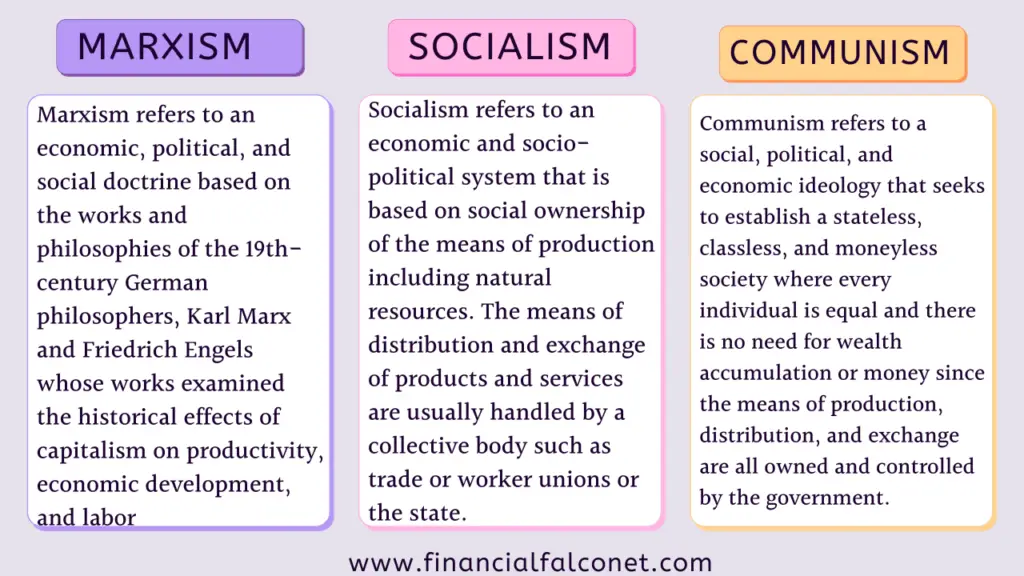The terms Marxism vs socialism vs communism refer to sociopolitical and economic systems that are often wrongly used interchangeably by people. Although these terms share some similarities being that they all do not support capitalism, there are intrinsic differences between each of them. In this article, we shall discuss marxism vs socialism vs communism, paying particular attention to the differences and similarities they share. But before we get to that, let us discuss the meaning of each term.
See also: Classical Liberalism vs Libertarianism Differences and Similarities
Marxism vs Socialism vs Communism explained
As mentioned earlier, marxism, socialism, and communism are closely related terms that are often confused, to clear the confusion, let us discuss each term.
Marxism
Marxism refers to an economic, political, and social doctrine based on the works and philosophies of the 19th-century German philosophers, Karl Marx and Friedrich Engels whose works examined the historical effects of capitalism on productivity, economic development, and labor.
They portend that the form of economic organization within a given society influences all other social phenomena in that society such as legal systems, social relations, ideologies, political institutions, cultural systems, and aesthetics thereby forming a base and foundation upon which the society is built.
Marxism views capitalism as an unsustainable economic system that is incapable of improving the living standards of the majority of the population due to its overt concern with competition, profit, and individualism. Hence they propose that capitalism will have to be replaced by a system that considers the common good, cooperation, and benefit of the masses over and above individualism and competition. As a result, marxism advocates for the abolition of private property, the establishment of a classless society, and a centrally planned economy in which the means of production such as land, capital, resources, and factories are collectively owned and controlled through worker self-management or the government.
Marxists opine that in order to achieve a society where the masses benefit from the resources available in the community where they reside, there would be a revolutionary move commonly referred to as the dictatorship of the proletariat. This is usually the transitional stage from which society will turn to either socialism or communism. At this transition stage, the working class (proletariat) overthrows the capitalist and capitalism. The proletariat holds political power and controls the means of production, distribution, and exchange at this stage before the society transforms further into a socialist, and ultimately, into a communist state, depending on how the societal change evolves.
Ultimately, marxism eliminates the class disparities and income inequalities that are an inherent part of capitalist societies, replacing them with a system where social class is abolished and every individual has equal opportunities as well as wealth.

Socialism
Socialism refers to an economic and socio-political system that is based on social ownership of the means of production including natural resources. The means of distribution and exchange of products and services are usually handled by a collective body such as trade or worker unions or the state. This means that all individuals within the community have access to and can benefit from the resources available as everyone works for the benefit of society. Products and services are produced based on their usage value rather than exchange value, hence everything that is produced is considered a social product, and it is distributed to all citizens who need it for their survival or that participated in the production process.
A key feature of socialism is the central planning of the economy. This implies that decisions concerning what to produce, how to produce, for whom to produce, and in what quality or quantity to produce are determined by a central planning committee. The committee also determines investments, wages, and the prices of goods and services. The main aim of socialism is the egalitarian distribution of wealth and income to create a society where all individuals have equal access to opportunities and the basic necessities of life such as education, food, healthcare, shelter, and transportation.
Socialism further advocates for a peaceful transition from capitalism to socialism. Socialists propose that this can be achieved when the capitalist willingly agrees to share their wealth with the poor through various wealth redistribution avenues such as progressive taxation for the provision of social safety nets and basic amenities. They also propose that it can be achieved through adequate enlightenment and education of individuals about the importance of social justice, equality, and cooperation which are the bedrock of socialism.
Communism
Communism refers to a socio-political and economic ideology that seeks to establish a stateless, classless, and moneyless society where every individual is equal and there is no need for wealth accumulation or money as no one owns personal property since the means of production, distribution, and exchange are all owned and controlled by the government.
This means that land, labor, capital, and all other resources are controlled by the government. Similar to socialism, the economy is usually centrally planned, thus development of infrastructure and production are centrally determined to ensure the all-round development of the society. Communism is one of the many forms of socialism.
Since communist nations do not usually use money, it means that the government distributes essentials such as food and clothing to the citizens. Additionally, jobs and housing are usually allocated to individuals, thus the government determines where individuals live and work. Due to the aforementioned, communist countries are often authoritarian nations with very few individual rights and freedoms.
However, social friction between rural and urban cultures as well as white and blue-collar workers are successfully eliminated. The government’s provision of basic necessitates, such as food, housing, education, transportation, and healthcare ensures equality of access to these services.
See also: Social Democracy vs Social Liberalism Differences and Similarities
Marxism vs Socialism vs Communism Differences
- Marxism is an economic, political, and social doctrine based on the works and philosophies of Karl Marx and Friedrich Engels. Socialism is an economic and socio-political system that is based on social ownership of the means of production including natural resources. Communism is a socio-political and economic system that seeks to establish a classless and moneyless society.
- Marxism analyzes capitalism and recognizes the need to do away with the system. Socialists propose socialism as an alternative to capitalism and communist proposed communism as an alternative to capitalism.
- Maxism has no other forms, socialism has several forms and communism is one of them.
- Marxism is founded on research and the analysis of capitalist systems with particular emphasis on its effects on productivity, economic development, and labor. Both socialism and communism have Marxist principles inherent in them.
- Marxism advocates for collective ownership of the means of production, socialism advocates for social ownership of the means of production, while communism advocates for state ownership of the means of production.
- Marxism and socialism support individual freedom and liberty as far as they are beneficial to society while communism does not uphold individual freedom, instead, the government controls individual decisions to a very significant extent.
- Marxism may support private property rights provided they are not exploitative. Socialism may support private property based on needs rather than wants. Communism does not support private property in any form.
- Marxism advocates for the abolition of social classes. Under socialism, class differences may exist but are usually not well-pronounced. Communism does not support class differences.
Summarized differences between Marxism, Socialism, and Communism
| Comparison criteria | Marxism | Socialism | Communism |
|---|---|---|---|
| Definition | An economic, political, and social doctrine based on the works and philosophies of Karl Marx and Friedrich Engels whose works examined the historical effects of capitalism on productivity, economic development, and labor. | An economic and socio-political system that is based on social ownership of the means of production including natural resources. | A socio-political and economic system that seeks to establish a stateless, classless, and moneyless society. |
| Collectively-owned | Analyzes capitalism and recognizes the need to replace it with a different system | Proposed as an alternative system to capitalism | Proposed as an alternative system to capitalism |
| Forms | No forms | Comprises different forms | It is an authoritarian form of socialism |
| Principles | Founded on research and the analysis of capitalist systems with particular emphasis on its effects on productivity, economic development, and labor. | Individuals contribute their skills and abilities toward societal development and have their needs met based on their contribution | Individuals contribute their skills and abilities towards community development and have their needs met |
| Means of production | Individuals contribute their skills and abilities toward community development and have their needs met | Socially owned | Communally owned |
| Individual freedom and liberty | Supported | Supported | Restricted |
| Private property rights | Partly supported in some instances | Partially supported if it benefits the society | Opposed as everything is owned by the government |
| Production and distribution | Production is based on usage value rather than profitability. | Production is based on usage value and distribution is coordinated based on needs | Production is based on usage value and distribution is done at no charge to the citizens |
| Social class | Advocates for the abolition of social classes. | Social classes may exist but the differences are insignificant | Social class differences are nonexistent |
See also: Classical Liberal vs Neoliberal Differences and Similarities
Similarities between Marxism, Socialism, and Communism
- Marxism, socialism, and communism are all based on Marxist ideologies.
- All oppose capitalism and seek to address the ills associated with the system especially the unequal distribution of resources, wealth, and income.
- All aim to achieve a society devoid of social class divisions.
- They all advocate for some form of collective ownership of the means of production.
- Marxism, socialism, and communism support production based on usage value rather than exchange value.
- They support cooperation, collectivity, and communal cohesion.
- They all support the existence of an extensive welfare state to cater to the basic necessities of individuals especially the vulnerable members of society such as the elderly, sick, disabled, and children.
- Central planning is a common feature of marxism, socialism, and communism.
See also: Economic Liberalism vs Capitalism Differences and Similarities
Conclusion
Marxism, socialism, and communism differ considerably in the fact while Marxism is a research framework and ideology, socialism, and communism represent socio-political and economic frameworks that may exist in society.
Additional differences exist in their principles, ownership, and control of the means of production, the level of individual freedom and liberty, as well as the social class stratification.
Common similarities exist in their emergence from the ideologies of Karl Marx and Friedrich Engels as well as their support of a collective society where the needs of each individual are adequately met in order for individuals to enjoy a good quality of life.
Last Updated on November 2, 2023 by Nansel Nanzip BongdapBlessing's experience lies in business, finance, literature, and marketing. She enjoys writing or editing in these fields, reflecting her experiences and expertise in all the content that she writes.
